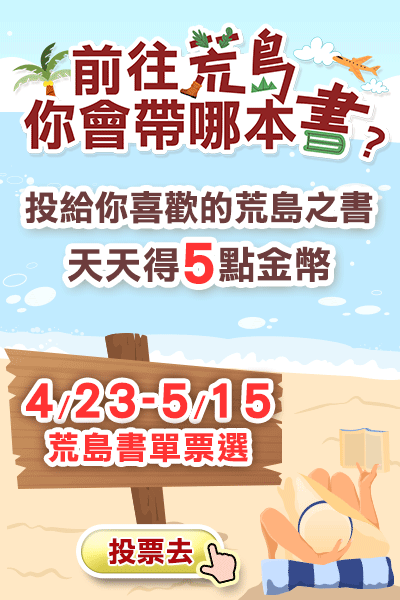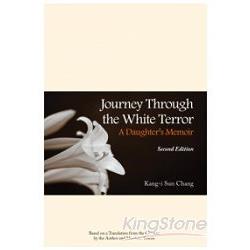Journey Through the White Terror:A Daughter's Memoir (英文版-第2版)
-
95折 285元
300元
-
 預計最高可得金幣10點
?
可100%折抵
預計最高可得金幣10點
?
可100%折抵
活動加倍另計 -
HAPPY GO享100累1點 4點抵1元折抵無上限
- 作者: Written by Kang-i Sun Chang 、 translated by Kang-i Sun Chang 追蹤 ? 追蹤作者後,您會在第一時間收到作者新書通知。
- 出版社: 臺灣大學 追蹤 ? 追蹤出版社後,您會在第一時間收到出版社新書通知。
- 出版日:2013/02/01
配送方式
-
台灣
- 國內宅配:本島、離島
-
到店取貨:
不限金額免運費




-
海外
- 國際快遞:全球
-
港澳店取:



內容簡介
Kang-i Sun Chang is Malcolm G. Chace ’56 Professor of East Asian Languages and Literatures at Yale University. In her memoir, Journey Through the White Terror, she tells the powerful story of her father Paul Sun (1919-2007). Along with numerous others, Sun was imprisoned more than 60 years ago during the “White Terror”, the decade following the withdrawal of Chiang Kai-shek’s Nationalist government from Mainland China to Taiwan in mid-December 1949. During this time, the Nationalist government implemented a policy of “better to kill ten thousand by mistake than to set one free by oversight,” and as a result, many innocent civilians such as the author’s father became victims of ferocious searches and persecutions. At the time of her father’s arrest, Prof. Chang was not quite six years old; when her father returned home, she was almost sixteen. Having witnessed the injustice of her father’s imprisonment and the freedom their family later enjoyed in America, she felt compelled to write this story.
Prof. Chang’s account of how the family survived the White Terror makes her book one of the most intense and thrilling works on the subject. But the book is also about soul-searching and the healing of a childhood trauma. It is a true story about the triumph of the human spirit in the face of adversity. Love and religion in such circumstances prove to be the ultimate deliverance. All this is described in considerable detail in this extraordinary memoir.
Prof. Chang’s account of how the family survived the White Terror makes her book one of the most intense and thrilling works on the subject. But the book is also about soul-searching and the healing of a childhood trauma. It is a true story about the triumph of the human spirit in the face of adversity. Love and religion in such circumstances prove to be the ultimate deliverance. All this is described in considerable detail in this extraordinary memoir.
名人推薦
“A prize winning scholar and teacher, Kang-i Chang shows another rare gift in this powerful memoir. Journey Through the White Terror is an unforgettable account of a child and family caught in the storm tides of history. Though the subject is deeply emotional, Professor Chang’s clarity and honesty prevail throughout.”—Richard H. Brodhead, President, Duke University
“Compared to the experiences of many White Terror victims, the story of Kang-i Sun Chang’s parents has a happy ending. And what moves us most is not only the deep love that her father and mother shared, allowing them to remain mutually faithful for so long, but also the self-respect and determination to overcome hardship that was born in the midst of their great individual solitude.”—David Der-wei Wang, the Edward C. Henderson Professor of Chinese Literature, Harvard University
“In this highly original and emotionally evocative work, Kang-i Chang recounts the memoir of her childhood during the White Terror with profound psychological insight into the critical value of family and faith as she and her parents navigate the shifting tides of politics and fortune. And in an unforgettable way, she again reminds us of the great pain carried always by all such survivors, reflecting, in the words of William Faulkner: ‘The past is never dead. It’s not even past.’ ”—John F. Setaro, M.D., Associate Professor of Medicine, Yale University School of Medicine
“The content [of this book] is striking in its immediacy, heart-warming in its humanity, and as a historical document it is extraordinarily informative about otherwise shadowy events. It is truly a deeply moving story, or collection of stories, that will long stay in my memory.”—F.W. Mote, the late Professor Emeritus of Chinese History, Princeton University
“An incomprehensible accusation, unaccountable acts of benevolence, a sensitive account of difficult times and the story of the growth of a scholar’s mind: such is the content of Journey Through the White Terror, tied up with ironies of fate and happy endings. Kang-i Sun Chang’s family history intertwines with the creation and dissolution of political blocs, shifts in Chinese and Taiwanese identity, and the opening-up of the United States to Asian immigration. It makes Cold War Asia understandable through the gestures of daily life, of sewing, rumors, sweet potatoes, and long-awaited letters.”—Haun Saussy, University Professor of Comparative Literature, University of Chicago
“Compared to the experiences of many White Terror victims, the story of Kang-i Sun Chang’s parents has a happy ending. And what moves us most is not only the deep love that her father and mother shared, allowing them to remain mutually faithful for so long, but also the self-respect and determination to overcome hardship that was born in the midst of their great individual solitude.”—David Der-wei Wang, the Edward C. Henderson Professor of Chinese Literature, Harvard University
“In this highly original and emotionally evocative work, Kang-i Chang recounts the memoir of her childhood during the White Terror with profound psychological insight into the critical value of family and faith as she and her parents navigate the shifting tides of politics and fortune. And in an unforgettable way, she again reminds us of the great pain carried always by all such survivors, reflecting, in the words of William Faulkner: ‘The past is never dead. It’s not even past.’ ”—John F. Setaro, M.D., Associate Professor of Medicine, Yale University School of Medicine
“The content [of this book] is striking in its immediacy, heart-warming in its humanity, and as a historical document it is extraordinarily informative about otherwise shadowy events. It is truly a deeply moving story, or collection of stories, that will long stay in my memory.”—F.W. Mote, the late Professor Emeritus of Chinese History, Princeton University
“An incomprehensible accusation, unaccountable acts of benevolence, a sensitive account of difficult times and the story of the growth of a scholar’s mind: such is the content of Journey Through the White Terror, tied up with ironies of fate and happy endings. Kang-i Sun Chang’s family history intertwines with the creation and dissolution of political blocs, shifts in Chinese and Taiwanese identity, and the opening-up of the United States to Asian immigration. It makes Cold War Asia understandable through the gestures of daily life, of sewing, rumors, sweet potatoes, and long-awaited letters.”—Haun Saussy, University Professor of Comparative Literature, University of Chicago
目錄
From “Swallowing Hatred” to Gratitude: Witnessing the White Terror-David Der-wei Wang
Preface
CHAPTER 1: The February 28th Incident
CHAPTER 2: Age Six
CHAPTER 3: Father’s Story
CHAPTER 4: On the Road to Visit My Father in Prison
CHAPTER 5: My Teacher Mr. Lan
CHAPTER 6: Mother’s Steadfastness
CHAPTER 7: Out from Prison
CHAPTER 8: A Tale of Two Families
CHAPTER 9: Reborn from the Ashes
CHAPTER 10: In the Language Gap
CHAPTER 11: My Uncle Chen Pen-chiang and the Taiwanese Writer Lu Heruo
CHAPTER 12: The Escape from the Tiger’s Mouth
CHAPTER 13: Red Bean Inspiration
CHAPTER 14: Victims on Both Shores
CHAPTER 15: Journey Through the Classics
CHAPTER 16: Moses as I Know Him
CHAPTER 17: The Pragmatic Pioneer
CHAPTER 18: Second Aunt’s Legacy
CHAPTER 19: The Last Card
CHAPTER 20: A Trip to Angel Island
CHAPTER 21: Return to Green Island
CHAPTER 22: My Father’s Hands
Timeline of Major Events
A Short List of Key Words, Names, and Terms
Preface
CHAPTER 1: The February 28th Incident
CHAPTER 2: Age Six
CHAPTER 3: Father’s Story
CHAPTER 4: On the Road to Visit My Father in Prison
CHAPTER 5: My Teacher Mr. Lan
CHAPTER 6: Mother’s Steadfastness
CHAPTER 7: Out from Prison
CHAPTER 8: A Tale of Two Families
CHAPTER 9: Reborn from the Ashes
CHAPTER 10: In the Language Gap
CHAPTER 11: My Uncle Chen Pen-chiang and the Taiwanese Writer Lu Heruo
CHAPTER 12: The Escape from the Tiger’s Mouth
CHAPTER 13: Red Bean Inspiration
CHAPTER 14: Victims on Both Shores
CHAPTER 15: Journey Through the Classics
CHAPTER 16: Moses as I Know Him
CHAPTER 17: The Pragmatic Pioneer
CHAPTER 18: Second Aunt’s Legacy
CHAPTER 19: The Last Card
CHAPTER 20: A Trip to Angel Island
CHAPTER 21: Return to Green Island
CHAPTER 22: My Father’s Hands
Timeline of Major Events
A Short List of Key Words, Names, and Terms
序/導讀
自序
Journey Through the White Terror tells the story of my father Paul Sun, who, like many others, was imprisoned more than 60 years ago during the “White Terror,” the decade following the withdrawal of Chiang Kai-shek’s Nationalist government from Mainland China to Taiwan in mid-December 1949. During this time, the Nationalist government implemented a policy of “better to kill ten thousand by mistake than to set one free by oversight,” and as a result, many innocent civilians such as my father became victims of ferocious searches and persecutions. At the time of my father’s arrest, I was not quite six years old; when he returned home, I was almost sixteen. Having witnessed the injustice of my father’s imprisonment and the freedom my family later enjoyed in America, I felt compelled to write this story. I have included in the book reflections on my father’s imprisonment and absence during my childhood, as well as accounts of the experience of my other family members and friends. The book concludes with thoughts on my life in the U.S.
But my book is not accusation literature. Neither is it literature of the wounded. On the contrary, this is a book about soul-searching and the healing of a childhood trauma. As I stand at today’s high point and recall the past, I find that I have learned a great deal; I had always thought that the hardships encountered in my youth were a deficiency in my life, but now I discover that they were a spiritual asset. I am grateful for those difficult early life experiences, for they allowed me to acquire maturity quickly while growing up, and allowed me to find a complete self amid shortcomings.
Thus, this book is also about bidding farewell to the White Terror. Although the chapters and passages written in my memoir often relate to the inhumanity of the White Terror, the foundation of the book rests on sketches of real-life heroes in the modern world. Those heroes are often nothing other than modest mentors whose talent and generosity helped us survive the difficult times. It is about aunts and uncles and friends whose contributions to the lives of our family will always be treasured by us.
Here, you will find the story of a pedicab driver who made it possible for a political prisoner to be briefly reunited with his family. You will read how that same driver’s act of generosity—which took place in Taiwan—was returned as a favor to the benefit of another pedicab driver after the lengthy span of fifty years on the mainland, in Beijing. And you will find the story of an unassuming elementary schoolteacher in Taiwan who gave me my earliest lessons in Chinese philosophy, which would later become one of the subjects that I teach in the U.S. Among the book’s most significant stories are those of important literary figures who were family friends. One of them, Chang Wo-chun, assisted our family during a risky journey out of the mainland in 1946. Then there is the story of my uncle Chen Pen-chiang and the novelist Lu Heruo, whose firm adherence to the ideals of socialism led to one of the most significant political uprisings of the post-1949 era in Taiwan. Finally, but far from least among them, there is the story of my parents, who had learned to hear the voice of God. B9Their faith helped sustain them through the difficult journey of the White Terror.
The White Terror in Taiwan generally refers to the period of martial law that began in 1949. But in fact, as early as 1946, people in Taiwan could already sense that catastrophic times could erupt at any moment. Our family must have been among the first Mainlanders to go to Taiwan, as we left China in the spring of 1946. China was still ruled by Chiang Kaishek’s Kuomintang (KMT). A year before that, World War II had just ended, marking a special year of victory for the Chinese, as Japan, the common enemy of all of China, was finally defeated. With Japan’s surrender, Taiwan was restored to Chinese rule after fifty years
Journey Through the White Terror tells the story of my father Paul Sun, who, like many others, was imprisoned more than 60 years ago during the “White Terror,” the decade following the withdrawal of Chiang Kai-shek’s Nationalist government from Mainland China to Taiwan in mid-December 1949. During this time, the Nationalist government implemented a policy of “better to kill ten thousand by mistake than to set one free by oversight,” and as a result, many innocent civilians such as my father became victims of ferocious searches and persecutions. At the time of my father’s arrest, I was not quite six years old; when he returned home, I was almost sixteen. Having witnessed the injustice of my father’s imprisonment and the freedom my family later enjoyed in America, I felt compelled to write this story. I have included in the book reflections on my father’s imprisonment and absence during my childhood, as well as accounts of the experience of my other family members and friends. The book concludes with thoughts on my life in the U.S.
But my book is not accusation literature. Neither is it literature of the wounded. On the contrary, this is a book about soul-searching and the healing of a childhood trauma. As I stand at today’s high point and recall the past, I find that I have learned a great deal; I had always thought that the hardships encountered in my youth were a deficiency in my life, but now I discover that they were a spiritual asset. I am grateful for those difficult early life experiences, for they allowed me to acquire maturity quickly while growing up, and allowed me to find a complete self amid shortcomings.
Thus, this book is also about bidding farewell to the White Terror. Although the chapters and passages written in my memoir often relate to the inhumanity of the White Terror, the foundation of the book rests on sketches of real-life heroes in the modern world. Those heroes are often nothing other than modest mentors whose talent and generosity helped us survive the difficult times. It is about aunts and uncles and friends whose contributions to the lives of our family will always be treasured by us.
Here, you will find the story of a pedicab driver who made it possible for a political prisoner to be briefly reunited with his family. You will read how that same driver’s act of generosity—which took place in Taiwan—was returned as a favor to the benefit of another pedicab driver after the lengthy span of fifty years on the mainland, in Beijing. And you will find the story of an unassuming elementary schoolteacher in Taiwan who gave me my earliest lessons in Chinese philosophy, which would later become one of the subjects that I teach in the U.S. Among the book’s most significant stories are those of important literary figures who were family friends. One of them, Chang Wo-chun, assisted our family during a risky journey out of the mainland in 1946. Then there is the story of my uncle Chen Pen-chiang and the novelist Lu Heruo, whose firm adherence to the ideals of socialism led to one of the most significant political uprisings of the post-1949 era in Taiwan. Finally, but far from least among them, there is the story of my parents, who had learned to hear the voice of God. B9Their faith helped sustain them through the difficult journey of the White Terror.
The White Terror in Taiwan generally refers to the period of martial law that began in 1949. But in fact, as early as 1946, people in Taiwan could already sense that catastrophic times could erupt at any moment. Our family must have been among the first Mainlanders to go to Taiwan, as we left China in the spring of 1946. China was still ruled by Chiang Kaishek’s Kuomintang (KMT). A year before that, World War II had just ended, marking a special year of victory for the Chinese, as Japan, the common enemy of all of China, was finally defeated. With Japan’s surrender, Taiwan was restored to Chinese rule after fifty years
訂購/退換貨須知
退換貨須知:
**提醒您,鑑賞期不等於試用期,退回商品須為全新狀態**
-
依據「消費者保護法」第19條及行政院消費者保護處公告之「通訊交易解除權合理例外情事適用準則」,以下商品購買後,除商品本身有瑕疵外,將不提供7天的猶豫期:
- 易於腐敗、保存期限較短或解約時即將逾期。(如:生鮮食品)
- 依消費者要求所為之客製化給付。(客製化商品)
- 報紙、期刊或雜誌。(含MOOK、外文雜誌)
- 經消費者拆封之影音商品或電腦軟體。
- 非以有形媒介提供之數位內容或一經提供即為完成之線上服務,經消費者事先同意始提供。(如:電子書、電子雜誌、下載版軟體、虛擬商品…等)
- 已拆封之個人衛生用品。(如:內衣褲、刮鬍刀、除毛刀…等)
- 若非上列種類商品,均享有到貨7天的猶豫期(含例假日)。
- 辦理退換貨時,商品(組合商品恕無法接受單獨退貨)必須是您收到商品時的原始狀態(包含商品本體、配件、贈品、保證書、所有附隨資料文件及原廠內外包裝…等),請勿直接使用原廠包裝寄送,或於原廠包裝上黏貼紙張或書寫文字。
- 退回商品若無法回復原狀,將請您負擔回復原狀所需費用,嚴重時將影響您的退貨權益。








商品評價